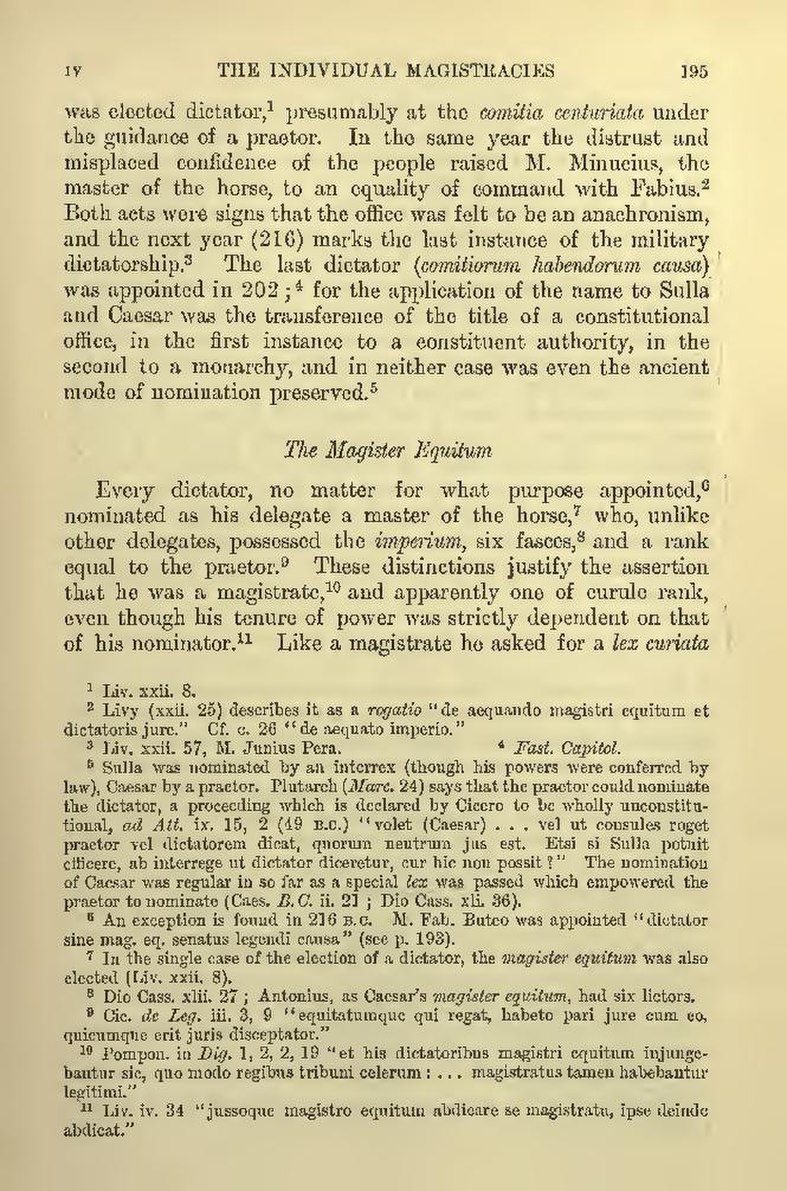was elected dictator,[1] presumably at the comitia centuriata under the guidance of a praetor. In the same year the distrust and misplaced confidence of the people raised M. Minucius, the master of the horse, to an equality of command with Fabius.[2] Both acts were signs that the office was felt to be an anachronism, and the next year (216) marks the last instance of the military dictatorship.[3] The last dictator (comitiorum habendorum causa) was appointed in 202;[4] for the application of the name to Sulla and Caesar was the transference of the title of a constitutional office, in the first instance to a constituent authority, in the second to a monarchy, and in neither case was even the ancient mode of nomination preserved.[5] The Magister Equitum
Every dictator, no matter for what purpose appointed,[6] nominated as his delegate a master of the horse,[7] who, unlike other delegates, possessed the imperium, six fasces,[8] and a rank equal to the praetor.[9] These distinctions justify the assertion that he was a magistrate,[10] and apparently one of curule rank, even though his tenure of power was strictly dependent on that of his nominator.[11] Like a magistrate he asked for a lex curiata
- ↑ Liv. xxii. 8.
- ↑ Livy (xxii. 25) describes it as a rogatio "de aequando magistri equitum et dictatoris jure." Cf. c. 26 "de aequato imperio."
- ↑ Liv. xxii. 57, M. Junius Pera.
- ↑ Fast. Capitol.
- ↑ Sulla was nominated by an interrex (though his powers were conferred by law), Caesar by a praetor. Plutarch (Marc. 24) says that the praetor could nominate the dictator, a proceeding which is declared by Cicero to be wholly unconstitutional, ad Att. ix. 15, 2 (49 B.C.) "volet (Caesar) . . . vel ut consules roget praetor vel dictatorem dicat, quorum neutrum jus est. Etsi si Sulla potuit efficere, ab interrege ut dictator diceretur, cur hic non possit?" The nomination of Caesar was regular in so far as a special lex was passed which empowered the praetor to nominate (Caes. B.C. ii. 21; Dio Cass. xli. 36).
- ↑ An exception is found in 216 B.C. M. Fab. Buteo was appointed "dictator sine mag. eq. senatus legendi causa" (see p. 193).
- ↑ In the single case of the election of a dictator, the magister equitum was also elected (Liv. xxii. 8).
- ↑ Dio Cass. xlii. 27; Antonius, as Caesar's magister equitum, had six lictors.
- ↑ Cic. de Leg. iii. 3, 9 "equitatumque qui regat, habeto pari jure cum eo, quicumque erit juris disceptator."
